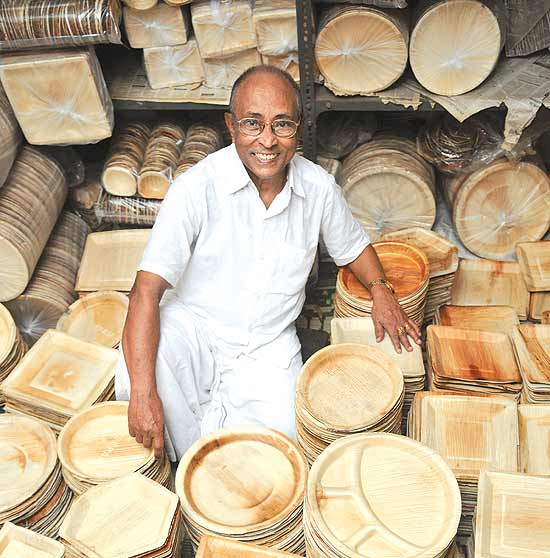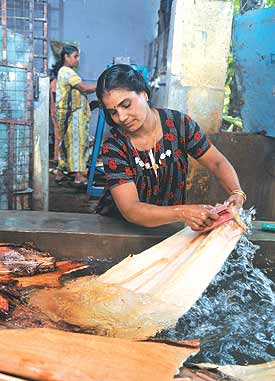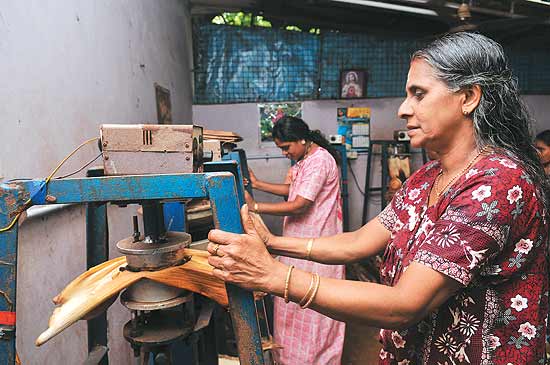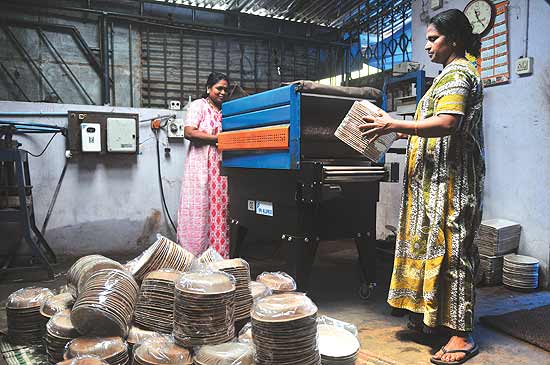Dr. Singh, Los Angeles, December 7, 1973: […] Some scientists say that we have improved on nature by making things like plastic and medicine.
Srila Prabhupada: In Vedic times people ate on silver and golden plates, but now the scientists have improved things with plastic plates.
Dr. Singh: The plastic has become a great problem because they cannot get rid of it. There is no way to dispose of it. It just continues to pile up. Full Conversation

Business Outlook Magazine | Sep 03, 2011 — Meet Lonap-pan Panthallookaran. The wiry, bespectacled Class 10 drop-out and quintessential small-town boy is an embodiment of the never-say-die spirit. He’s been trying his hand at entrepreneurship since the 1950s and not always successfully.
[…]
In 1987, while travelling by train to visit his daughter and son-in-law in Calcutta, Panthallookaran and his wife were served food in dishes made of dried leaves (probably banyan). The leaky, fragile dishes were a nightmare to eat from and Panthallookaran fell to wondering whether there weren’t sturdier materials available in nature that could be made into disposable dishes.
There was—the leaves of the arecanut (supari) palm trees. The result was the conception and formation of Deepam Palm Dish, now a Rs 2-crore company with ambitions of doubling revenue in five years and expanding overseas to Bali in Indonesia.
 “Dishes made from other leaves are usually smaller leaves stitched together. These tend to be thin and leaky. The areca palla (stem) is ideally suited for moulding since it is flat and suitably thick,” explains Panthallookaran.
“Dishes made from other leaves are usually smaller leaves stitched together. These tend to be thin and leaky. The areca palla (stem) is ideally suited for moulding since it is flat and suitably thick,” explains Panthallookaran.
The process is relatively simple. The dried palla is sometimes brushed with turmeric and then washed before it is run through different moulding machines to cut it into specific shapes. These are then baked at 100 degree Centigrade for three minutes, packed by hand in batches of 25 and made airtight by machine. Moulding is a technique used for making plastic and other dishes that was already prevalent all over the country.
Panthallookaran modified it by experimenting with temperatures suitable for palm leaves and has devised a pedal-operated machine specially for these leaves.
The result: plates, bowls, soap dishes and trays that are not only eco-friendly and biodegradable, but also aesthetically appealing. Moreover, points out Panthallookaran, his company is “promoting community development by turning agricultural waste into disposable plates”.
Palm on the community
Deepam Palm Dish’s production centre is a bright yellow, double-storeyed building located at the back of a half-acre tenement at Thrissur. Several women in long cotton gowns chat as their hands move swiftly to pack the palm-leaf dishes. “These plates are used at the Thrissur Pooram,” says Sunishi Narayan, one of the packers. Thrissur Pooram is an annual temple festival in the city to which millions of devotees and visitors throng. “The prasadam is served in these plates,” she adds proudly.
Panthalookaran sells varying quantities of the palm-leaf vessels—while some are bought 1,000 pieces at a time, orders for plates, for instance, may go up to 20,000 units in one go. Deepam also sells about 2,000-5,000 soap dishes a day. Typically, customers are hotels, temples, exotic soap manufacturers and caterers.

|
More than the sales, though, Panthallookaran is proud of the social impact of his venture. Deepam has set up, trained and facilitated technological know-how and equipment transfer to more than 100 plate-making units in Kerala, Tamil Nadu, Karnataka and Assam. That’s providing employment to 60,000-100,000 workers, each getting Rs 120-130 a day. The company also buys arecanut leaves from farmers in sizeable quantities, which would otherwise go waste, thus putting money in the pockets of penniless farmers.
Finally but certainly not the least, these plates are very eco-friendly since they are biodegradable, can be used as fuel for firewood, are a good source of fertiliser and can be broken down into vermicompost. “We provide a three-fold benefit to society,” Panthallookaran says.
Initially, the capital required came from the profits of ‘s’s umbrella business (the business is now looked after by his son). However, there was a shortfall, which was met by approaching the National Small Industries Commission. “I received approval for funding for Rs 5.95 lakh. Of this, I had to put down a deposit of Rs 3 lakh. Later, I also approached Canara Bank for meeting my funding requirements. I was also approached by venture capital firm Venture India but our thinking was divergent,” he says.
Setting up Deepam wasn’t easy. Funds were hard to come by, equipment was scarce and the leaves being used as raw material were not of good quality. “I approached many people for help in acquiring machines for the production process. The first machines we acquired were faulty. The goods produced were of defective quality. After two years we acquired better machines and the quality standards improved,” he says.
Deepam used to source a major chunk of its leaves from Nilambur, near the Kerala border. But there were issues: at Rs 1 per leaf, these were expensive; moreover, delivery was often delayed and what would be delivered was often less than what was ordered.
Today, the company sources 40% of its leaves from a unit near Bangalore. A single delivery comprises 17,000 to 20,000 leaves and is cheaper by 10-20 paise per leaf.

Branching Out
Panthallookaran is now focusing on expansion in India and abroad. He has acquired a plot and constructed a bigger unit at Ollary in Kerala. He also is looking to augment his export business: he already exports about 25% of the plates to the US, UK, Italy and the Netherlands.
“The export business started in 2008 and yields me good profit margins of about 15-25%. I am now getting regular orders from the United Kingdom,” he explains.
A unit in Bali, Indonesia, is also in the offing. But not everyone is confident Panthallookaran can scale up his business to that degree and so fast. Anil Kumar, Manager of Canara Bank at Thrissur, believes that while the basic concept of Deepam is sound and viable and its social spinoffs huge, the growth potential is definitely limited. “At Rs 2-3 per plate, these dishes are not for the common man. This makes the market for Deepam a niche one. As such, expansion can only be slow,” Kumar contends. Still, it may work to Deepam’s advantage that Panthallookaran is quick to smell business opportunities.
In 2003, he sought the patronage of the then Railways Minister Lalu Prasad Yadav to introduce palm-leaf dishes in trains. Lalu liked the idea and announced it in Parliament. Panthallookaran is still benefiting from the resultant publicity, even though he stopped supplying to the railways because of delayed payments.







Speak Your Mind